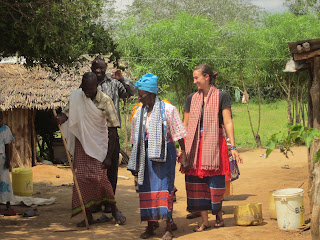Everyone contributed and all these things were acquired and prepared. The specially picked out my hondo color fabric and old mamas made it using the old techniques of washing and folding it a certain way. Then two lesos were bought, one my grandmother would wear a piece of and the other, my great uncle (one of the village elders) would wear. The brought everything together to my family’s home which is in one of the sub-villages of Jilore, called Sosoni . Here would be my birth home. My “father” or “Baba” is Karema who is the clerk at the dispensary. Upon my arrival, he gave me my Giriama name, thus I was adopted into my family.
The ceremony was set to begin at 9am and promptly began at 1pm. Oh Kenyan time….WAY worse than Jew time for those of you that know my Jew time schedule. We arrived at my family’s home and the men sat on one side of the tree and the women on the other. The ceremony was started with some word from the headmaster, my father Karema, and then a discussion of what I have accomplished here in Jilore. All this being said in KiGiriama, their mother tongue language. I was taken off to get dressed in the traditional wear.
I was brought out by a line of singing mamas and was presented to the crowd. Everyone was laughing and enjoying the show. It felt very happy. Then I sat in front of one of the mud houses and the ceremony began. Amos, my great uncle, said some blessing words and then my Grandmother, who I am named after, stands up and welcomes me to the family, gives me blessings, and then takes a drink out of the traditional cup and spits on herself three times and then takes another sip and spits the water on my chest three times as well. The rest of the water in the coconut cup is poured out in front of me and the celebrating starts.
We sat and watched the Giriama dancers dance and my Baba, is presented with some jugs of Mnzai, the locally brewed coconut wine. All the men partake in the drinking. Then my Baba presents me with a goat that is then slaughter for us all to eat. The goat he presented wasn’t the one that we ate due to time constraints. He gave me a big, male goat that was kinda freaking out. I was a little worried that he was going to run away and he was worried he was going to be eaten!
At this point, it starts raining heavily. This is seen as huge blessing to the village when rain comes with visitors or during ceremonies. It means that they will have a good harvest and continued good luck into the next one. As it looks, it’s still on track to keep raining and people have started to harvest. Yay!
So we waited out the rain which lasted about an hour and then we ate a tasty goat and ugali. After we ate I thanked everyone and left the men too keep drinking their palm wine and we started to walk home still wearing my hondo. Let’s just say I attracted some attention on the way home….more than normal.
It was truly an honor to be a part of something like this and to know that they put it together all themselves for just me. There was video taken which they want to have edited and have captions to translate it. They will be keeping a copy of it in the Resource Center library, so that future people can know the history of someone who influenced the construction of the Jilore Vijana Resource Center and helped the community in different ways.
xoxox




